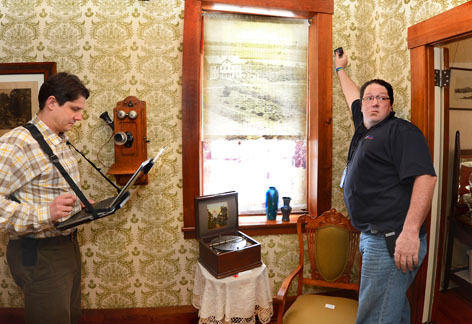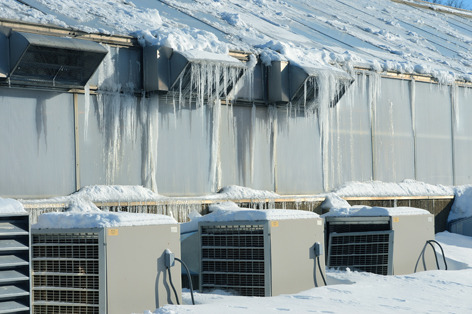Mapping the wireless future

Thomas Robillard (left) and Jeremy Wirtz, contractors for Des Moines-based Forsythe Solutions, surveyed wireless access in Farm House Museum on Monday. Photo by Bob Elbert.
Phones, laptops, tablets, game consoles, printers and more. How many personal electronics do you have? With record-breaking enrollment and the popularity of multiple devices, Iowa State's wireless network is in need of reinforcement.
To help plan for improvements, information technology services (ITS) contracted with Des Moines-based Forsythe Solutions to design an optimal wireless access map of campus. The three-month building inventory cost an estimated $250,000.
"The design criteria assumes that each user has three wireless devices on campus and five devices in the residence halls," said Jennifer Lohrbach, ITS senior systems analyst.
Survey squad
Forsythe's two-person tech teams are in the midst of surveying campus and residence buildings, covering about two buildings per day. The techs, who are harnessed with laptops bristling with external modems, take readings from different locations throughout each building.
The data is being used to design a map of enough wireless access points to provide optimal service in campus buildings and residences. The survey will wrap up by the end of the month, and Forsythe should submit its final report to ITS by the end of May.
Tech investment
Using the report results, implementation of the upgrades will proceed as funding allows. The residence department already committed $1.5 million to upgrade access in its buildings and will get started on improvements in its buildings as soon as possible.
"While our initial Wi-Fi installation was the best system available at that time, the current proliferation of wireless device use by our residents has outpaced the capacity," said Pete Englin, residence director. "We're delighted to partner with ITS in serving our future residents with a terrific wireless system that performs far better than anything available off campus."
The university's computation advisory committee (CAC), which oversees the use of student technology fees, has earmarked $2 million in matching funds for wireless upgrades. Lohrbach said funding decisions from a university budget request will be made later this spring.
Access points in campus buildings could be added as soon as May, beginning in The Hub and Ross, Snedecor and Gilman halls. Lohrbach said full implementation could triple the wireless coverage in campus buildings over the next two years.
A long, cold winter challenges Iowa State's infrastructure

The icicles cascading from the roof of this campus greenhouse help tell the story of this winter's extreme cold. Photo by Bob Elbert.
Mother Nature has dealt us a long, cold, snowy winter, and it's beginning to take a toll on the campus infrastructure.
Beware of potholes
Potholes are a common winter nuisance, and this year is no exception. Holes are dotting streets and parking lots all over campus, thanks to a thawing-freezing pattern. Facilities planning and management crews are repairing the potholes with an asphalt-based material called cold-patch, but FPM director Bob Currie said it's just a temporary fix.
"We're trying to fill the potholes with the cold-patch now, but they may need to be refilled again when it warms up," Currie said. "It's hard to get the cold-patch to stick to the holes because there's just so much snow and ice."
Snowplow blades also remove patch material from repaired potholes.
In the deep freeze
This winter's incessant subzero temperatures have significantly deepened underground frost levels, creating more challenges for FPM. A problem obvious to campus drivers is the speed-bump effect on some streets. The cold ground expands and contracts, forcing seams in the streets to rise. The problem also occurs under sidewalks.
"In some instances, the heaving can cause tripping hazards, so we use the cold-patch asphalt to smooth out the unevenness," Currie said. "Waiting for warmer weather and the subsoil to thaw is the best option."
If warmer spring temperatures don't fix the problem, portions of the affected sidewalks and streets may need to be ground down at the seams or be replaced.
Cracked water lines are another symptom of deep frost levels. The lines break when the earth expands and contracts, putting pressure on the pipes. Under usual winter conditions, the frost line stops above the buried water lines; this year has been the exception.
"We've had above-average water line breaks this year," Currie said.
Crews are repairing the lines as they break, so be on the lookout for temporary lane and sidewalk closures throughout campus for the rest of winter.
The bitter cold is causing problems above ground, too. Drains that lead from roofs and gutters on some buildings are backed up with ice, which means melting snow runs off roofs like waterfalls. In some cases, underground drains are jammed with ice, requiring special equipment to remove the ice.
Again, the best fix for this problem is warmer temperatures, Currie said. But until that happens, FPM crews are redirecting the melting snow to minimize water damage.
Residence difficulties
The Department of Residence also has experienced some challenges with this winter’s extreme cold. During a particularly cold stretch in February, several sprinkler pipes froze in locations that had not experienced problems before. Broken pipes can cause water leaks and in some cases, short periods of water and electrical service interruptions.
“Our residents have been extremely understanding in situations where broken pipes impact their homes,” said Randy Monthei, manager of residence hall maintenance. “We partner with FPM, respond to issues as quickly as possible and make repairs so that the issues don’t happen again.”
Cold-weather alerts also are issued to educate residents about closing windows and how to properly operate their heating units.
Tough working conditions
Currie said FPM employees are used to working extra hours throughout the winter, cleaning streets and sidewalks. But, he admits, this year has been a challenge.
"We've had a lot of weekend snow events so the staff has had to come in on Saturdays and Sundays a lot lately," Currie said.
Bitter cold temperatures are another concern.
"It's been difficult for the staff working outside," Currie said. "We take frequent breaks to have them come indoors and get warmed up. We need to make sure people are safe."
Some good news
Though winter has been tough on campus streets and buildings, there is one bright spot. Iowa State's sand and salt supplies are adequate for the rest of winter.
"We're doing okay," Currie said. "We've had a lot of snow but we haven't had pure ice events, which depletes the sand and salt supplies." Currie said streets usually receive a sand/salt mix while sidewalks may receive all sand or the street mix, depending on the severity of the ice event.
"We treat the sidewalks almost every day just because of the ice buildup," he said.
So far this year, FPM has used 444 tons of salt and 2,342 bags of mix for steps and sidewalks. During last year's warmer, milder winter, FPM spread 207 tons of salt and used 962 bags of mix.
Winter will end, eventually
While the calendar says March, it feels more like January. Currie said the negative effects of this winter's bitter cold could last a little longer.
"It probably will be late March before we reverse the trend," he said.
Convention space proposal is defeated
Iowa State leaders expressed disappointment Wednesday with Ames voters' rejection of a $19 million bond referendum that would have paid for half of a proposed renovation and convention space addition to the Scheman Building at the Iowa State Center.
By nearly a 2-to-1 margin – 63 percent to 37 percent – voters defeated a proposal to raise property taxes to pay for half of the proposed $39 million project. The measure needed 60 percent approval to pass. Nearly 12 percent (4,950) of registered voters cast a ballot.
"Tuesday's vote is extremely disappointing as we look at the significant multiuse space needs of the community and the university," said President Steven Leath. "We believe a strong case was made for the new convention center with a cost-sharing partnership between the city and Iowa State.
"This vote means we'll be unable to meet the needs of some groups that want to come to Ames," he added.
Senior vice president for business and finance Warren Madden also noted that the vote doesn't change the space needs, and said the university will continue to work with the city and the Ames Convention and Visitors Bureau to investigate other options for solving the need for more convention and meeting space in Ames.
"Ames voters made it clear that this proposal was not acceptable," he said.
In a preliminary estimate, about $6.5 million of the proposed project was intended to upgrade existing space in Scheman. Madden said the 40-year-old building still needs to be renovated to serve meeting and conference attendees. That may have to occur room by room, as funds are identified, he said.
"The funding reality is that this project would compete with our other campus needs, many of which are driven by student enrollment and student needs," he said. "Those [student] projects would be the priority, as they should be."
He said there are no immediate plans for what happens next.
Parking and student residence proposals go to regents
Annual parking permits would go up $12 (reserved and 24-hour reserved) or $6 (general staff, Ames Lab, residence, departmental, vendor) under a rate proposal going to the state Board of Regents next week. Motorcycle permits would go up a proposed $3 and academic year student parking, including residence lots and the football stadium lots, also would go up a proposed $6.
The board meets Wednesday, March 12, in the University of Iowa student union. The full agenda is online and a live audio stream of public portions of the meeting are available from the board's website.
Annual parking permits for the Memorial Union ramp, including employee permits, would go up a proposed $12 and semester permits would go up $6 ($5 for summer). The cost of a "winter" permit (November through February) would not change.
ISU's parking division, based on a recommendation from the Transportation Advisory Council, also will seek to increase the illegal parking fine by $10, to $40, beginning July 1. The illegal exit fine at the MU ramp would go up a proposed $15, to $65.
Proposed permit increases on July 1
|
Permit |
Current |
Proposed |
|
24-hour Reserve |
$866 |
$878 |
|
Reserve |
$491 |
$503 |
|
General staff* |
$152 |
$158 |
|
Vendor |
$191 |
$197 |
|
Departmental |
$152 |
$158 |
|
Motorcycle |
$50 |
$53 |
|
Memorial Union |
|
|
|
Annual |
$498 |
$510 |
|
Employee |
$498 |
$510 |
|
Fall, Spring |
$214 |
$220 |
|
Winter |
$214 |
$214 |
|
Summer |
$172 |
177 |
* Includes residence department, Ames Lab staff permits
Residence hall rate increases
Iowa State proposes to increase all resident hall rooms and Frederiksen Court apartment rates 1.5 percent for the 2014-15 academic year and the Schilletter/University Village apartments 1 percent. Semester meal plans would go up 1.3 to 1.4 percent, as requested, and block meal plans (25 to 100 meals) would go up 1.5 percent.
The proposed increases would equate to an additional $109 for a student opting for the standard rate, which features a double room without air conditioning ($4,154) and the Gold meal plan of 225 meals and 200 dining dollars each semester ($3,676 for the year). The total for this package would be $7,830.
Room rates vary according to building, air conditioning availability and number of roommates.
In other business, Iowa State will ask to:
- Award a Doctor of Humane Letters to Stephen Rapp for his leadership in prosecuting individuals responsible for crimes against innocent people. Rapp, a Cedar Falls native, heads the Office of Global Criminal Justice in the U.S. State Department. President Barack Obama appointed him Ambassador-at-large for War Crimes Issues in 2009. He is a former Iowa legislator (1973-75, 1979-83) and former U.S. Attorney for the Northern District of Iowa (1993-2001). The honorary degree would be awarded at spring commencement on May 10. Faculty members in the anthropology department nominated Rapp for the honor.
- Terminate the master of agriculture program in professional agriculture, launched in 1981 as a distance education option, due to a wider range of more focused graduate program options for students and reduced faculty interest in the program. The proposed termination would take effect when its 26 enrolled students complete the program, no longer than five years.
- Change the name of a bachelor's program in the College of Agriculture and Life Sciences, from public service and administration in agriculture, to agriculture and society. The proposed name reflects the program's focus on the social and human sides of agriculture, and is intended to help strengthen students' efforts to market themselves to would-be employers. If approved, the change would occur this August.
- Receive an annual report on student retention and graduation rates at the three universities. Iowa State's one-year retention rate for the fall 2012 class was 87.1 percent; the average one-year retention rate during the last 10 years is 85.4 percent.
Following the fall 2007 entering class
|
University |
Iowa State |
Iowa |
Northern Iowa |
|
Graduated |
67.9% |
69.6% |
66.5% |
|
in 3 years |
1.5% |
1.2% |
1.6% |
|
in 4 years |
36.1% |
46.3% |
35.2% |
|
in 5 years |
25.5% |
19.4% |
25.6% |
|
in 6 years |
4.8% |
2.7% |
4.1% |
|
Returned for a 7th year |
2.6% |
1.3% |
1.5% |
|
Left the school |
29.5% |
29.1% |
32.0% |
|
after 1 year |
16.5% |
16.9% |
16.3% |
|
after 2 years |
8.2% |
7.7% |
7.8% |
|
after 3+ years |
4.8% |
4.5% |
7.9% |
The power of 10

A night of Broadway musical hits is on tap when Australia's Ten Tenors stop in Ames for their March 13 engagement at Stephens Auditorium (7:30 p.m.). The cast of acclaimed voices will cover a set list that ranges from powerful hits to haunting ballads from some of the best-known Broadway shows. The group, which started as a collection of college friends more than 15 years ago, has entertained millions during its worldwide tours.
Tickets, available at the Stephens box office or through Ticketmaster, are $39-$45 for the general public, $20 for ISU students and $23 for youth. The Celebrity Café will host a preshow event (7 p.m.) with John Busbee, founder and host of The Culture Buzz, a weekly program on Des Moines' KFMG 99.1 FM. Contributed photo.
